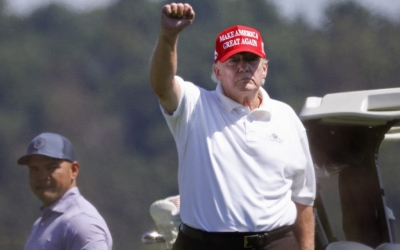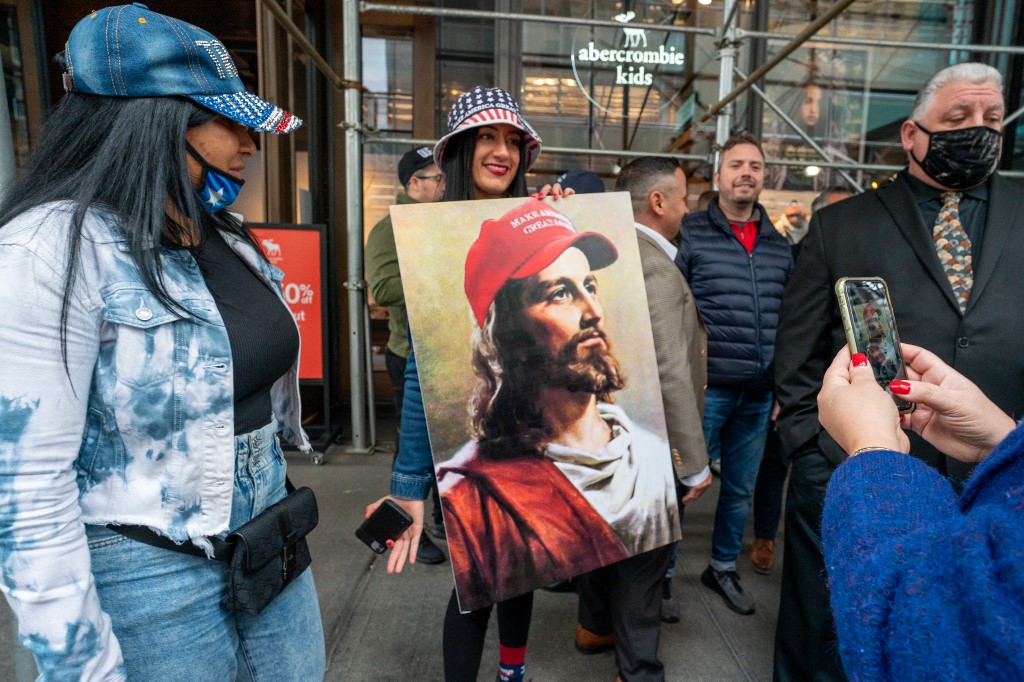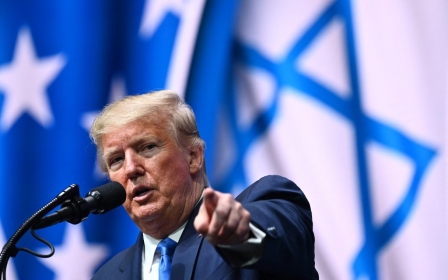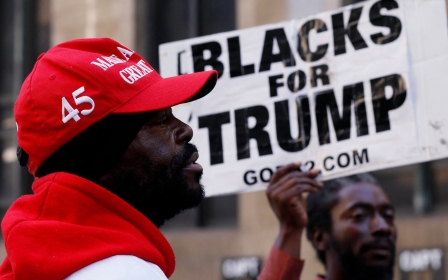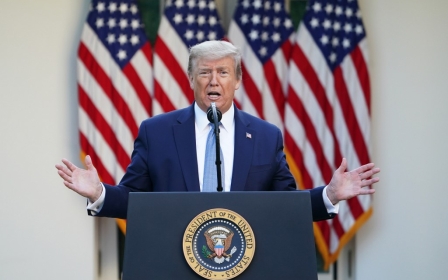Why Trump as Jesus Christ makes perfect sense to US evangelists

“Jesus was arrested and murdered by the Roman government. There have been many people throughout history that have been arrested and persecuted by radical corrupt governments and it’s beginning today in New York City.”
So said Republican Representative Marjorie Taylor Greene, sharing her heartfelt theological concerns over the arraignment of former US President Donald Trump earlier this month in New York.
Episcopal Bishop Reginald T Jackson, who oversees more than 500 churches in Greene’s home state of Georgia, did not care for the analogy and considered it “blasphemous and disgusting”, but Greene had countless other Americans supporting her sentiments.
Trump was arraigned in Manhattan because of allegations of corruption based on hush money he reportedly paid a porn star to keep her relationship with him secret so as not to damage his reputation as he was running for office.
Those allegations do not seem to bother his evangelical base, devoted as it is to the former US president's image as a devout Christian, to the extent that the sanctity of the figure of Christ is affixed to him. The roots and manifestations of this peculiar version of evangelical theology are extremely important for any understanding of American politics.
Soon after the Iranian revolution of 1977-1979, I began collecting evidence of the visual iconography of the revolution in whatever form and shape I could find.
My colleague, Peter Chelkowski, later joined me and together we wrote a book, Staging a Revolution: The Art of Persuasion in the Islamic Republic of Iran (1999), in which we offered a detailed interpretation of the visual iconography of the revolution.
A central theme in that iconography was of course the Shia martyrology that identified Ayatollah Khomeini and a whole generation of the victims of the Iran-Iraq war with Shia holy men.
Trump as Jesus Christ
Reminiscent of that Islamic martyrology we documented four decades ago in Iran, the patently Christian art now gathering momentum around the cultic figure of Trump is something quite serious. It would be a mistake to dismiss it with the usual arrogance of the liberal corporate media, which has generated much anger among the millions of people who consider themselves besieged and beleaguered “white Christian Americans”.
Yes, there are profound elements of white supremacy and racism in this Trump cult. But not all of this diehard Christian piety can be explained away thus.
There is genuine pain and evident hurt, some of it economic, some of it emotional, mixed with a sense of anomie and alienation. Some people who identify as white, Christian and conservative feel that their country, their culture and their religion are all under attack by coloured people, non-Christian people, radical liberals and the left. They are trying to “get their country back”.
People like Trump bank on such feelings and exploit them to their political advantage. Visionary but defeated statesmen such as Bernie Sanders were aware of such facts and sought to address them. But the dominant ideologues of the Democratic Party, represented by Barack Obama, Hillary Clinton and Joe Biden, were entirely complicit in their root causes and unable to address them.
It was only quite recently that a sizable industry of Christian iconography surrounding the figure of Trump emerged. Identification of Trump with the figure of Christ as he is perceived in the evangelical imagination is a key component of this political iconography.
“Since late 2020,” according to Snopes, a US fact-checking website, “a rather curious and controversial image has been floating around the internet. It's an image of a painting that shows former US President Donald Trump crucified like Jesus, with an American flag serving as the loin cloth worn by Jesus in most artistic depictions of the crucifixion.”
The iconography is complete with the figure of the former speaker of the House, Nancy Pelosi, piercing Trump's side with a spear while, Mary-like, Melania Trump sits at his feet, crying.
Trump has a history of comparing himself to Jesus Christ. “Someone said to me the other day,” he said back in 2020, “‘You’re the most famous person in the world by far’. I said, ‘No, I’m not’… they said, ‘Who’s more famous?’ I said: ‘Jesus Christ.'”
Connecting with his evangelical base and abusing their faith, while fulfilling his insatiable thirst for fame and fortune, are the common staples of Trump's political parlance.
Evangelical imperialism
The Christian Zionism embedded in this ideology has not been lost on either Trump or, of course, on Israeli propagandists. Trump has declared himself "the king of Israel" or "the chosen one", while his followers have not shied away from calling him “the second coming of God”.
When Trump moved the US embassy to occupied Jerusalem, the Israelis were ecstatic, actively comparing him to Cyrus the Great and minting a coin in his honour. According to Associated Press, “the Mikdash Educational Centre said the 'Temple Coin' features Trump alongside King Cyrus, who 2,500 years ago allowed Jews to return to Jerusalem from their exile in Babylon.”
The full dimensions of Evangelical imperialism gathering momentum around the mythic figure of Trump, however, goes far beyond the delusional attempts of Israelis to hang to any straw in their futile attempt to steal the entirety of Palestine.
In this figure of Trump as Christ, we are facing a Christian nationalism of much deeper and bolder proportions - the evidence of an imperial imagination that connects US warmongering around the globe with the Christian zeal of the conquistadors at the time of Christopher Columbus.
It is the Holy Roman Empire that this political theology fathoms, with Trump as the figure of not Just Christ but, in fact, Charlemagne.
That missionary zeal has now found a widely popular artist to give it artistic panache.
Lucrative market
“Conservative artist Jon McNaughton doesn't care about the haters, he just wants to paint Trump and Jesus.” That is the title of a piece detailing how Christian pop artist McNaughton has emerged at the centre of this renewed burst of Christology around the figure of Trump.
McNaughton is a Utah-based political artist devoted to a conservative and Christian perspective - and in the persona of Trump he has found his deepest inspirations. It is evidently a lucrative market, too.
A key aspect of this hugely popular art is that it goes viral on the internet. Central to its popularity is the mixing of biblical and American histories to forge a mythic space where Americans feel connected to a divine dispensation - and thus their proverbial sense of “exceptionalism” is theologically reasserted.
There is a deeply rooted Christian Republic, with its imperial imagination bursting to come out from within the American political culture
McNaughton's most recent painting, we learn, titled "Crossing the Swamp", went viral for its recasting of Emanuel Leutze's "Washington Crossing the Delaware" with members of the Trump administration.
We learn that the "painting depicts Trump as Washington, while paddling through a swamp outside the US Capitol building surrounded by National Security Adviser John Bolton holding a hunting rifle a la Elmer Fudd, Vice President Mike Pence holding the American flag, and Housing and Urban Development Secretary Ben Carson apparently paddling in the wrong direction”.
The politics of this art form is self-evident, with Trump and his MAGA diehards the last remaining bastions in the battle to save America from powerful liberal establishment forces.
But what McNaughton is doing is far more than a contemporary political act. He is actively reimagining American history in unabashedly evangelical, white supremacist and racist images.
There is a deeply rooted Christian republic, with its imperial imagination bursting to come out from within the American political culture - with a potent antisemitism and now Islamophobia as its key manifestations.
When he wrote his now classic book, American Theocracy: The Peril and Politics of Radical Religion, Oil, and Borrowed Money in the 21st Century (2006), Kevin Phillips was fully aware of this fact and had seen the George W Bush presidency as the epitome of it.
Almost two decades later, the prospect of a rank charlatan taking hold of this deep-rooted, blindfolded evangelical vision of the world in the US is ever stronger.
The views expressed in this article belong to the author and do not necessarily reflect the editorial policy of Middle East Eye.
Middle East Eye propose une couverture et une analyse indépendantes et incomparables du Moyen-Orient, de l’Afrique du Nord et d’autres régions du monde. Pour en savoir plus sur la reprise de ce contenu et les frais qui s’appliquent, veuillez remplir ce formulaire [en anglais]. Pour en savoir plus sur MEE, cliquez ici [en anglais].



